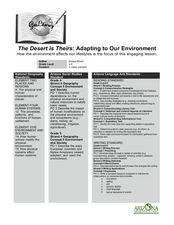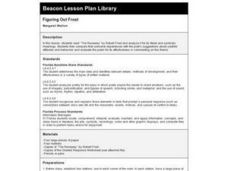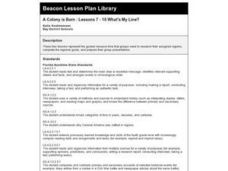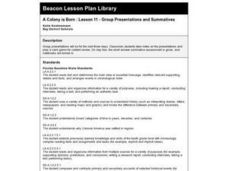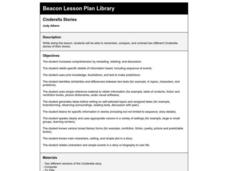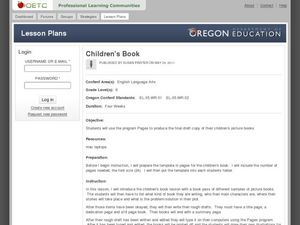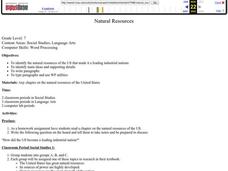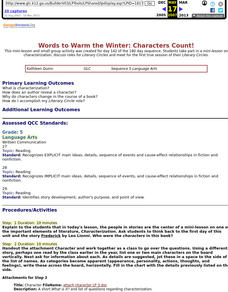Curated OER
Elements of Myth
Students read and act out myths. In this world mythology lesson, students read and analyze myths from various cultures and then recognize their attributes as they prepare presentations of myths that explain natural phenomena.
Curated OER
The Desert is Theirs: Adapting to Our Environment
Students determine how animals and people adapt to the desert environment. In this desert lesson, students review vocabulary about the desert and how humans have to make changes to accommodate their environments. They listen to and...
Curated OER
Analyze The Learner; Chocolate Fractions
Third graders describe, represent and compare fractions using pieces of a chocolate bar. In this fractions lesson, 3rd graders demonstrate how to read and write fractions correctly. Students then integrate technology by using...
Curated OER
Cloudy With A Chance of Meatballs
Second graders explore weather. In this weather lesson, 2nd graders read Cloudy With A Chance of Meatballs and participate in four supplemental science activities. Students participate in Internet research, create weather maps,...
Curated OER
Figuring Out Frost
Fourth graders read "The Runaway" by Robert Frost and analyze it for its literal and symbolic meanings. They compare their personal experiences with the poet's suggestions about youthful attitudes and behaviors. Some nice worksheets are...
Curated OER
Building Reading Skills: Fluency
Middle schoolers practice their fluency skills. In this fluency lesson, students read aloud stories to their peers and they help to coach one another on their fluency, pronunciation, phrasing, and inflection. They discuss what makes a...
Curated OER
A Colony is Born : Lesson 6 -To Leave or Not to Leave
Fifth graders connect reasons for coming to the New World with identity. The create identities and place them in one of three settled regions. They refer to prior study notes in their Colonial Notebooks to establish their identities.
Curated OER
A Colony is Born : Lessons 7 - 10 What's My Line?
Fifth graders research their assigned regions, complete regional guide and prepare presentations about the New World colonists. They refer to "Everyday LIfe: Colonial Times" as well as searching marked internet sites.
Curated OER
A Colony is Born : Lesson 11 - Group Presentations and Summatives
Fifth graders give presentations on colonial research. The others take notes on the presentations. They play a card game which helps them review content. They take a summative assessment and present their research notebooks.
Curated OER
Cinderella Stories
Students read and compare Cinderella stories using a worksheet. They write and illustrate original tales with a twist.
Curated OER
A World of Myths
Students read and write myths. In this world mythology lesson, students read and analyze myths from various cultures and then recognize their attributes as they write their own myths to explain natural phenomena.
Curated OER
1st Grade - Act. 22: Retelling the Tiny Seed
First graders write sentences and illustrate ways seeds travel.
Curated OER
Autobiographies: A Jigsaw Puzzle
Students read The Autobiography of Ben Franklin. Using construction paper, they cut out five jigsaw puzzle pieces in different shapes using the entire sheet of paper. They write events from their own lives on the puzzle pieces, thus...
Curated OER
Keith Haring & Social Awareness
Students view four sections of one of Haring's paintings. They describe the people and characters they see. Students participate in a variety of classroom art activities such as: Making a treasure box modeled after Keith Haring's work,...
Curated OER
Organ Systems
Students state the name of major body systems, They identify what each system does and list the major organs in each system. In addition, they complete a puzzle matching organ systems to organ function.
Curated OER
Burger King Investigation
Students study data on the nutritional value of Burger King meals in order to discover its nutritional value and also to compare the meals, using mathematical computation, to the recommended daily diet. In this data handling lesson...
Curated OER
Have I Got a Graphic Organizer for You
Use Inspiration software to create webs. You have to create discussion topics (none are provided here), but learners will enjoy working with pairs and technology.
Curated OER
Children's Book
A great way to publish students' stories is by having them create a picture book using Pages. This simple lesson plan has them take a short story they have written and create a book with a title page and dedication. After they have...
Curated OER
Creating a Life Map
Students create their own life map in which they introduce themselves to each other by sharing what they are most proud of. They use a life map to expressive themselves creatively.
Cloud Front
Persuasive Speech Graphic Organizer
Support your learners during the speech-writing process with a five-page graphic organizer. Pupils have plenty of space to write in their evidence and arguments on this resource. The organizer provides some prompts for each section to...
Curated OER
Natural Resources
Seventh graders consider how US natural resources have helped it to become a leading industrialized power. They research, discuss, write and edit an expository paragraph in groups. They can present paragraph to another class or compile a...
National Council of Teachers of English
Writing Acrostic Poems with Thematically Related Texts in the Content Areas
Scholars scour thematically aligned texts to gather a bank of words they can use in an original acrostic poem.
Curated OER
Words to Warm the Winter: Characters Count!
Fifth graders take part in a mini-lesson on characterization, discuss roles for Literary Circles and meet for the first true session of their Literary Circles.
Curated OER
French: One-Sided Telephone Conversations
Allo? Qui est-ce? Hone the listening skills of your Francophiles by simulating telephone conversations. After reviewing basic french telephone expressions (some are included here), they conduct two conversations per day for one week. A...
Other popular searches
- Main Ideas Details
- Main Ideas and Details
- Main Ideas & Details
- Main Ideas Supporting Details
- Main Ideas. Supporting Details
- Topic Main Ideas Details
- Main Ideas, Details

